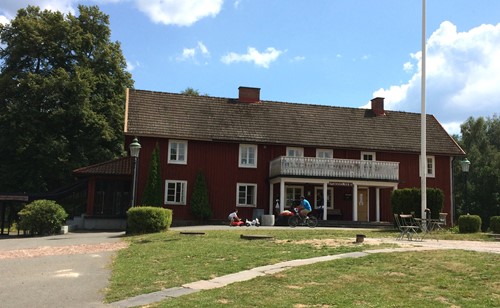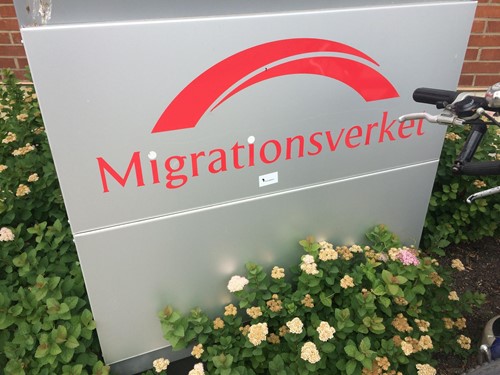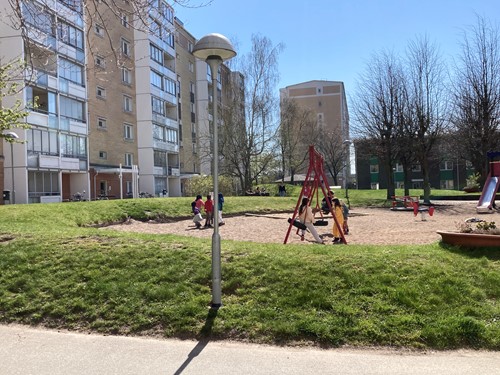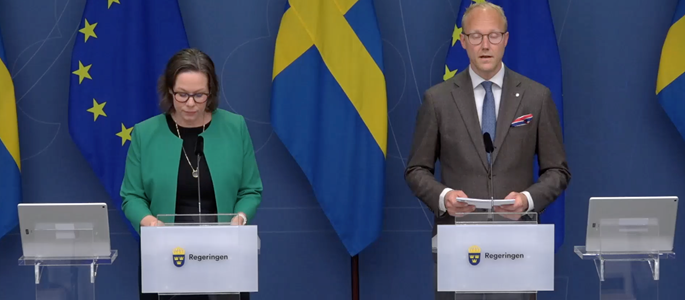Sweden wants to copy Denmark's asylum policy
After decades with an image as Denmark's opposite pole, Sweden is now taking over the hard line towards refugees
Tidöavtalet (in Swedish)
Analysis of the migration- and integration parts of the agreement from the Swedish NGO Asylrättscentrum (in Swedish)
Analysis of the legal aspects of the agreement from the Swedish NGO Human Rights Defenders (in English)
The Swedish government's news page on migration policy (in Swedish)
Sweden's current government is a coalition between the Moderates, the Liberals and the Christian Democrats. One of the first things the government did was to make a written agreement in October 2022 with the Sweden Democrats called the Tidö Agreement presenting a radical tightening of immigration policy, directly inspired by Danish rules. It is now being implemented gradually and will have enormous consequences.
Developments in Swedish and Danish asylum policy
Since 2001, Denmark has gradually tightened the rules on foreigners as much as international law allows and has deliberately tried to make the country as unattractive as possible for refugees in particular. It has largely succeeded, seeing historically low figures for the arrival of refugees, and an erosion of rights, which has often drawn condemnation from human rights organizations and committees under the UN and the Council of Europe. Denmark's practice has also been ruled illegal several times by the European Court of Human Rights.
Sweden, on the other hand, has tried to keep a higher moral standard with more welcoming policy, which has resulted in Sweden over the years receiving between six and ten refugees every time Denmark has received one, measured in relation to the number of inhabitants. Sweden is one of the countries in Europe that has received the most refugees, and one in five inhabitants was born abroad.
Danish politicians have often highlighted Sweden as a worst-case scenario, and human rights defenders have conversely praised Sweden for taking responsibility and treating new citizens with respect. However, the image as a humanitarian beacon has not been fully deserved. Eg., the amount that asylum seekers receive per day in Sweden has not been raised since 1994, and it’s practically impossible to survive on what equals DKK 1,300 per month for a single person. At the same time, there has been much more radical opposition to immigration in Sweden, with 22 arson attacks against asylum centres in 2015 alone. Nor has it been as easy to get a residence permit as many would think.

Vacation resort used for refugee reception, Skåne 2016
Sweden's paradigm shift in 2015
The Swedish austerity actually started many years ago, and in some areas the Swedish practice has been even tougher than the Danish one. Just like Denmark, Sweden introduced a series of tough restrictions already in 2015 and closed its border completely to asylum seekers for five months from December 2016 to May 2017 – something that Denmark has never done, and which is a violation of both international asylum law and EU legislation.
A temporary law was introduced in 2016 and came to affect 100,000 pending asylum cases, and parts of the temporary law were later made permanent. Refugees were since then given only 13 months of residence at a time, and the right to family reunification was limited to refugees granted convention status, which is the strongest form of protection. At the same time, Sweden only granted convention status to one in four refugees in 2016, whereas 66% received it in Denmark. Rejected asylum seekers were no longer entitled to a roof over their heads, food or health services (families with children and the particularly vulnerable, however, excepted).
More restrictions followed later, and in practice Sweden has actually long had tougher requirements than Denmark when it comes to family reunification for refugees. Ukrainians have received less support and fewer rights in Sweden than in Denmark and Norway. The number of new arrivals has generally dropped, but the country is still quite high on the wish list of those heading to Europe.

Sweden wants to get rid of its good reputation
Today, Sweden is only No. 16 on the list of new asylum seekers per inhabitant in the EU. And the goal is to move even further down – while also returning more of those who have already arrived. The mood has turned in the Swedish population, and the Sweden Democrats won over 20% of the votes in the 2023 election. You can no longer ignore the right-wing nationalists and avoid cooperating with them – on the contrary, the government has invited them in formally as agreement partners, eg. in the Tidö agreement, which is rarely seen in a Danish context, where the Danish People's Party has never entered as an official government partner, but has stood on the side and negotiated special requests in return for support from their decisive mandates ever since 2001.
The recent years' major problems with gang crime and shootings, especially in Malmö, have been interpreted as evidence of a failed integration. In fact, Sweden can present far better figures in the area of integration than Denmark, especially when it comes to getting refugee women into the labour market, and the Swedish politicians have always talked about inclusion, respect and responsibility. But it’s also a fact that many areas on the outskirts of the larger cities are almost 100% inhabited by people with refugee and immigrant backgrounds, where the young people in particular feel left behind, not unlike France and England.
Minority citizens also constitute a clear economic underclass in Sweden, with low incomes and poor housing conditions. Refugees in Sweden often express that things only look nice on the surface, but that in practice they often experience widespread racism and encounter a system that does not help them in any way. Now Sweden has started to peel off the nice veneer and has gone the Danish way: don't think you're welcome, and if we can't get rid of you, you'll only be a second-class citizen.
Most recently, Sweden negotiated the new EU pact for asylum and migration during its position as chairman and pushed for some of the toughest parts of the pact – eg. that children under the age of 12 should not be exempt from being held in the closed detention centres at the borders, which will become one of the cornerstones of the pact.
The Tidö agreement
The parties behind the agreement describe it as a "paradigm shift" and are very clearly inspired by Danish politics. According to the Swedish government, migration is "the most important problem in society", and is thus prioritized over climate, health and schools. The agreement covers three areas: migration, crime and the rule of law. This article concentrates mostly on the 33 sections within migration, some of which are linked to crime.
Main goals for the government:
• Asylum must focus on temporary protection and on receiving refugees from Sweden's neighbouring areas.
• Sweden must not be more generous than EU law and international agreements require.
• An integration policy based on requirements – you must take responsibility for becoming an active part of society.
• Combat the 'shadow community' (i.e. people without legal residence) through more control and stricter reporting obligations.
• Tightened conditions for low-skilled labour immigration and easier conditions for highly skilled labour immigration
Most points in the agreement require changes to the law, and the government has initially set up various committees to investigate the possibilities of achieving the desired goals and which changes to the law will be required. Some of them have already submitted their results, and certain changes have either already entered into force or been proposed as legislation.
The main proposals are:
• The entire asylum process must take place in transit centres, thereby abolishing the current right of asylum seekers to find and pay for accommodation themselves. In addition, the government is looking into how freedom of movement can be restricted to special areas, how to keep track of exactly where the applicant is staying, as well as introducing a duty to report and sanctions for non-appearance, including stopping the asylum case altogether.
• The right to work while the asylum case is being processed is abolished, and the current option to "change track" and apply for residence on the basis of work, if you are refused asylum, is also removed.
• An option to revoke a residence permit due to "lack of good standing", i.e. bad behaviour. This includes people who are associated with crime, prostitution, abuse or extremist movements, i.e. conditions that do not lead to a deportation order.
• Withdraw residence permits if the original basis is no longer present, as long as EU law is not violated.
• Permanent residence is sought to be completely abolished in the long term for refugees and their family members, and the governement even wish to withdraw it for those who have already been granted it, if possible. Initially, there will be a requirement to pass a series of tests within Swedish language and knowledge about Swedish society. However, these tests must first be established, which has rather long prospects.
• Self-payment for interpreters after a certain period of stay.
• Focus on voluntary return to the home country for those who have a residence permit.
• New, strict requirements for obtaining Swedish citizenship: residence period of at least 8 years, self-sufficiency, good behaviour, language skills, knowledge of society, declaration of loyalty, possibility to revoke it later.
• Family reunification must be limited to what EU law dictates, and the requirement for self-sufficiency should only be exempted in exceptional cases. Later, a requirement for an age limit of 21 years for partners and spouses was added.
• Benefits for new arrivals must be reduced, and an accrual principle must be introduced (a family of 4 already only gets DKK 11-12,500 per month), and receipt of benefits must be made conditional on participation in language courses and job training.
• Police immigration checks must be increased to catch people without legal residence: camera surveillance, body searches, DNA samples, confiscation of mobile phones. Public servants must be required to check the person's residence permit, eg. schools, health centres, libraries, etc.
Among the changes that have already been implemented is a 25% increase in the police's "immigration checks" with increased powers to eg. body searches and house searches. The Migration Agency, the police and the tax authorities have been tasked with increasing the coordination of data with a view to getting more people without legal residence sent out of the country. The number of quota refugees has been reduced from 5,000 to 900 per year.
Bills have already been presented to limit family reunification and humanitarian stay and that applicants must stay in transit centres during the entire asylum process and lose the right to work in the future, and furthermore a decision has been taken to set up departure centres where rejected persons must stay. In addition, it has been decided to create more places in closed detention (förvar).
Regarding crime, some of the proposals are also aimed at foreigners:
• Option to deport non-Swedish citizens solely for being gang members, without a court decision on expulsion.
• Prohibition to stay in special areas for persons convicted of certain offences.
• Investigate a national ban on begging.
• Investigate the possibility of renting prison places abroad.

Residential area Holma in Malmö, 2023
A setback for the rule of law and integration
If you know the Danish immigration rules, you can clearly see that the majority of the Swedish proposals are directly taken from here – several even in a tougher version. Denmark's disregard for human rights when it comes to foreigners has clearly rubbed off on Sweden.
It is an incredibly sad development to choose punishment, coercion, mistrust and structural discrimination over trust, responsibility and positive incentives. The feeling of alienation and frustration will grow in the Swedish apartment blocks, and lead to even more unrest and conflict.
When last year Sweden was No. 16 in the EU for receiving asylum seekers measured per capita, there is no need at all for draconian austerity measures to deter new applicants, but instead focus should be on prevention for the minor group that causes problems – something that Denmark has good experience with. Gangs, violence and vandalism in the vulnerable residential areas in Sweden is very similar to the situation in France, and largely rooted in poverty, racism and social exclusion. By reducing the benefits and increasing the "immigration checks", the frustrations will only increase.
With the Tidö agreement, the state moves away from self-sufficiency and integration in the asylum phase, which goes against the recommendations of all experts and NGOs. Asylum centres with canteen food and years spent in inactivity have never brought anything but illness and depression. For those rejected, the departure centres in Denmark have not led to more departures, but simply to more mentally ill people and more people.
Hunting down the undocumented will inevitably lead to even more ethnic profiling, which will burden and stigmatize the vast majority of ethnic minorities with legal residence and a clean criminal record, when Abdi is stopped on the street every week, while Anders never is. The relationship of trust between citizens with a minority background and public employees will be undermined when, in the future, Latifah will be asked to show her residence permit at the emergency room or the library, but Linnea will not be asked to.
Setting up requirements for language skills and knowledge of society in order to obtain permanent residence and citizenship can be useful, positive incentives for better integration. But when the requirements are deliberately made unreasonably high in order to exclude as many as possible, it has the opposite effect: you feel like being a second-class citizen in your own country, and a constant sense of insecurity about the future.
It is incredibly problematic to consider deporting foreigners solely because of "bad behaviour" such as eg. abuse or prostitution. It is disrespecting the rule of law, just like when Denmark puts beggars in prison or allows members of the Citizenship Committee of the parliament to vote no to exemptions due to illness when it comes to applicants from Muslim countries.
Hopefully, EU law will limit some of the proposals, but unfortunately the entire EU is also on its way down a legal slippery slope, where with the new migration pact it has been decided to lock up all asylum seekers at the border, and where the right to asylum is already being violated by pushing people away from EU territory without dealing with their case.
Access to our articles is free,
but we survive only on
private donations!


